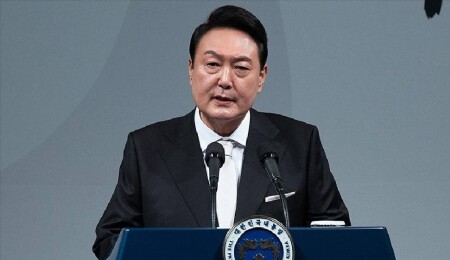South Korean President Banned from Leaving Country

South Korea's President Yoon Suk Yeol was banned Monday from travelling abroad, the justice ministry said, less than a week after he plunged the country into chaos by briefly imposing martial law.

Yoon sent special forces and helicopters to parliament on the night of December 3 before lawmakers forced him to rescind the order by rejecting his decree.
The unpopular leader narrowly survived an impeachment motion in parliament Saturday even as huge crowds braved freezing temperatures to call for his ouster.
Despite remaining in office, a clutch of investigations has been closing in on Yoon and his close allies, including a probe for alleged insurrection.
The ministry of justice confirmed on Monday that Yoon had become the first sitting South Korean president to be banned from leaving the country.
A lawmaker was asked at a Monday parliamentary hearing whether Yoon had been banned from international travel. "Yes, that's right," replied Bae Sang-up, an immigration services commissioner at the ministry.
Also under travel bans for their roles in last week's events are former defense minister Kim Yong-hyun -- currently in detention -- and ex-interior minister Lee Sang-min.
General Park An-su, the officer in charge of the martial law operation, and defense counterintelligence commander Yeo In-hyung are also barred from leaving South Korea.
Investigators hauled Park in for further questioning Monday, and Yonhap news agency reported that prosecutors had asked for a warrant for Kim's formal arrest.
'Second coup'
The impeachment push failed to pass after members of Yoon's own People Power Party (PPP) walked out of parliament, depriving it of the necessary two-thirds majority.
The PPP says that in exchange, the 63-year-old Yoon has agreed to hand power to the prime minister and party chief, prompting howls of protest from the opposition.
"This is an unlawful, unconstitutional act of a second insurrection and a second coup," Democratic Party floor leader Park Chan-dae said.
Under South Korea's constitution, the president remains head of government and commander in chief of the army unless he or she is incapacitated, resigns or steps down.
In such a case, power would then be handed to the prime minister on an interim basis until elections could be held.
Claiming Yoon can remain in office but has delegated his powers to the prime minister and leader of his ruling PPP -- who is not an elected official -- is "a blatant constitutional violation with no legal basis", Park said.
"Their attitude of placing themselves above the constitution mirrors that of insurrectionist Yoon Suk Yeol," he said.
South Korea's ally the United States indicated it would still deal with Yoon but said it "will keep lines of communication open with all relevant parties".
"President Yoon is the president of Korea, and the political process in Korea will play out, as it should, under Korea's laws and Korea's constitution," State Department spokesman Matthew Miller told reporters.
Power vacuum?
The defense ministry confirmed Monday that the embattled Yoon still oversees the country's security apparatus, despite the apparent power vacuum in a country that remains technically at war with nuclear-armed North Korea.
"Legally, (control of military forces) currently lies with the commander in chief," defense ministry spokesperson Jeon Ha-kyou said.
Yoon has apologised for "anxiety and inconvenience" caused by his declaration of martial law but has not stepped down, saying instead he would entrust decisions about his fate to his party.
He also said he would accept all political and legal responsibility for the martial law fiasco.
There is no constitutional basis supporting the ruling party's claim that Yoon can stay in office but hand over his power to unelected party officials, said Kim Hae-won, a constitutional law professor at Pusan National University Law School.
"It seems to resemble an unconstitutional soft coup," he told AFP.
"If there are issues with the president, there are ways laid out in the constitution such as suspending the president from his duties, and then move on to proceedings set out in the constitution, such as impeachment," he said.
The opposition has already said they would try again to impeach Yoon, with leader Lee Jae-myung saying another vote would be held Saturday.
Source: HDN


Comments
Attention!
Sending all kinds of financial, legal, criminal, administrative responsibility content arising from illegal, threatening, disturbing, insulting and abusive, humiliating, humiliating, vulgar, obscene, immoral, damaging personal rights or similar content. It belongs to the Member / Members.